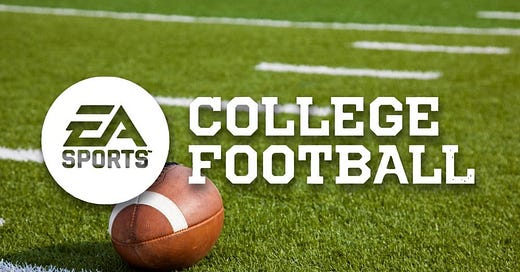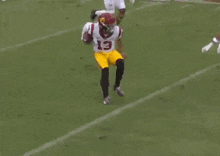With all due respect to the pump, this week, we’re priming the pod. Our first full episode of The Option, our docuseries on the NCAA, drops next week.
Hugely excited to show everybody what we’ve been working on, so keep an eye out for that come Monday. It’s all happening!
With that in mind, I wanted to write about college sports this week, and the news cycle decided to cooperate.
EA Sports’ series of college sports games are right at the center of the NIL revolution that has overtaken the landscape. They are the reason Ed O’Bannon, the last UCLA Bruin to conquer March Madness, took up the cause and changed everything. His lawsuit against the NCAA, for which he took a ton of undeserved flak, was the first and biggest domino that opened this all up.
As it happened, though, that lawsuit also effectively killed the video games, which didn’t help with the aforementioned flak.
With the announcement that EA Sports is now relaunching its College Football series, we’ve come full circle.
Well. Most of the way. Like 90% circle.
Because shortly after that announcement came a critical follow-up. A sign of the times. The clearest possible indication of how much has changed between now and the last edition, which came out in 2013.
As of last week, EA Sports is offering players $600, as well as a free copy of the game, to sign on the dotted line and consent to their name, image, and likeness appearing in the game.
“Athletes would remain in the game for their entire careers but could opt out of future editions if they choose. Athletes who remain in the game for multiple years will be paid annually, and players who transfer will continue to be compensated as long as they are on a roster.”
All 134 FBS schools are in, now that the last holdout — those famously independent Golden Domers — have finally gotten on board.
The company is at least right to use the following superlative: it is indeed the biggest NIL deal ever offered, to 11,000+ players, all at once. I’ll be interested to see where those numbers shake out in the end, though.
Paying a flat rate makes sense to me, but I’m not sure the amount is going to cut it for some guys. It’s a lowball offer, which I find more easy to read as what EA Sports has budgeted in total, right around $6.6 million.
Doing some quick back-of-the-envelope math, those games made EA Sports roughly $86 million a year in sales in the fifteen years it was around. And remember, that was ten years ago, back when the video game industry was not the size it is today. That all makes the earlier figure look pretty small.
So if I’m Caleb Williams, I’m saying to myself: $600 and a copy of the game? That’s it?
Good one. Take a seat.
Now, look. This is still welcome progress. Players have never been paid for this before, after all. Surely that’s a step in the right direction, and fans get to have their video game back. Win-win, right?
Almost. I’m just not sure this deal is a good one. Others have pointed out the absence of royalties as an additional issue.
I hope, if this offer stands, that college athletes will take it upon themselves to negotiate a better deal in the years to come. They have the leverage here. I wonder if they’ll use it.
Coaching Empathy
Anyways, this all got me thinking about something else in the world of college football recently.
Much has been made of Boston College head football coach Jeff Hafley’s decision to join the Green Bay Packers as a defensive coordinator, or, to a lesser extent, UCLA’s Chip Kelly taking a demotion to offensive coordinator at a better program in Ohio State. (Funny note: Kelly is replacing fellow ex-head NFL coach Bill O’Brien, who’s taking over for Hafley at BC. Small world! And, IMO, proof that maybe you shouldn’t read the following into this.)
Both moves have been interpreted as evidence that being a head coach in today’s college environment is no fun. Even Nick Saban’s retirement, though he is 72, could be seen in the same light.
I don’t doubt that’s true. I don’t want to discount how exhausting and annoying it must be to have to constantly re-recruit your entire roster, only to then lose players to the highest bidder, all with a distinct lack of transparency. That’s valid. I’d be tired too.
Here’s my caveat. You, FBS coach, have still got it pretty damn good. And I’d argue you had it way too good for the last however many decades, so you’ll have to forgive me if I’m not wheeling out a barrel of sympathy on this.
For whatever reason, people feel way more comfortable deploying the “You make millions of dollars; shut up and dribble” argument against players than coaches. That’s never made much sense to me.
The complaint here is that a lack of rules, contracts, etc. have allowed for limitless player movement. And again, I don’t even discount that. Some guardrails are absolutely appropriate. This is indeed out of hand.
ESPN’s Scott Van Pelt did his One Big Thing segment on this last week. Though I disagree with his framing, I’ve always liked SVP, and he correctly points out the following:
“That said, what currently exists is unlimited, unregulated free agency. No professional athletes have this.”
Right. They don’t.
But, in big-time college football in particular, coaches — who do have contracts, might I add — are still perfectly capable of ditching those deals.
Examples? You got it.
How about Kalen DeBoer, who just took over for Saban at Alabama? That’s a dream job. Nobody would blame him for pursuing a better opportunity, would they?
He signed an extension with Washington in 2022 that was set to take him through 2028. So much for that. To take that job, he left a five-year deal with Fresno State two years in.
Nobody seemed too scandalized by either move, despite the fact that you could credibly argue — check me out, I’m doing it now — that your head coach jumping ship is an even more destabilizing move than your cornerback transferring to Colorado to pursue a major in high-stepping.
And if you were mad about it, I bet you eventually said to yourself: well, he’s doing what’s best for him. It’s a business decision.
Coaches aren’t hemmed in by much of anything. They’re not penalized. Rather, mediocre to bad coaches are regularly rewarded with massive buyouts when they’re fired.
Texas A&M rightly canned Jimbo Fisher a few months ago. Guess what he got on the way out? A little over $76 million for his trouble. Not too bad.
So, let’s cool it with the coach stuff. These jobs are hard, I will freely grant you, but coaches are handsomely compensated for the hardship.
And if it’s overall stability you’re worried about, I’d suggest that whatever rules you come up with to constrain player movement, you mirror to some extent for coaches. Both contribute their fair share of chaos.
I don’t disagree that the current system is in no way, to borrow SVP’s word, sustainable. It’s a total mess, in desperate need of reform. That, too, I will freely grant.
As we look at our options to do that, though, let’s try and keep the wider context in mind. As it happens, that’s what I’m hoping to provide with The Option.
Here’s that trailer again if you missed it:
On Monday, you’ll get an email from The Option Podcast with the first episode. That’ll include links to find it on Apple Podcasts, Spotify, and YouTube, but it’ll appear wherever you get your podcasts (wow, still so fun to say that). But yeah. We’re worldwide.
Our first episode is the longest of the six and features no fewer than ten insightful guests, including such venerable experts as ESPN’s Jay Bilas, UNC Athletic Director Bubba Cunningham, The Wall Street Journal’s Jason Gay, and the lawyer behind NCAA v. Alston, Jeffrey Kessler.
Stop on by! It’s the college sports event of March, apart from that basketball tournament whose name I can’t remember. April something? Who’s to say.
Anyways, tune in! More to come Monday.
Also, This
Glad to see a bunch of new subscribers from the newly created
, c/o — welcome to the party!Caitlin Clark’s officially off to the league, which seems like the right move for her. I for one am pretty excited to see what she can do to juice viewership for the WNBA, just as she’s done in college: from the logo.
The Denver Nuggets seem to be rounding into form, now just 1.5 games out of the 1-seed in the West.
and the rest of the good folks at True Hoop asked who the best player in the NBA was this week, and I couldn’t type Nikola Jokiç fast enough. (It takes a second to get that Captain Hook ‘c’ in there, which is apparently called a cédille. Now you know!)The NFL salary cap is jumping by a record $30.4 million next season. First and foremost, that’s a sign that business is boomin’ for the biggest sport in the country. Sort of like a company boosting its dividend. For GMs, that’s a big leap up, with some real and positive implications for rosters.
The Phillies deciding to discontinue Dollar Dog Night over too many fans throwing hot dogs at each other is both the most Philadelphia thing I’ve heard in a while and a tragic miscarriage of justice. Save Dollar Dog Night, save the world.






